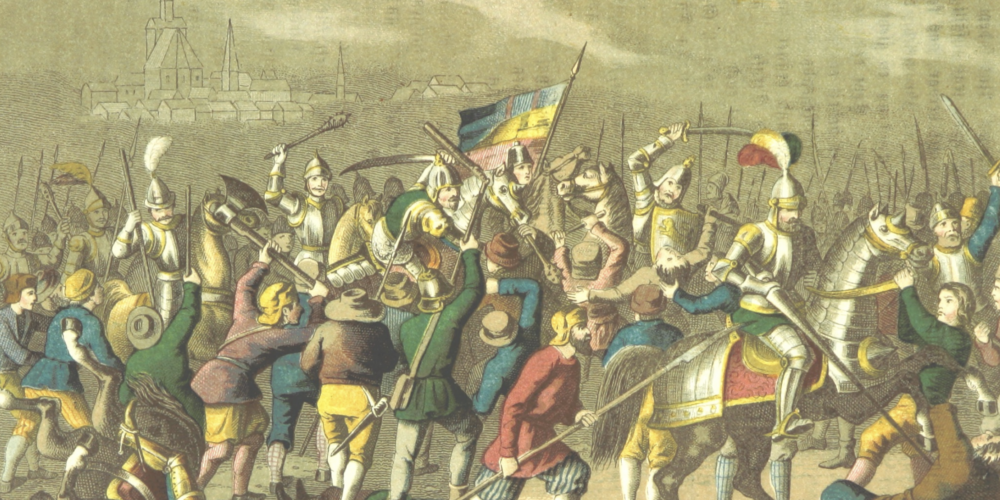Largely absent from the Western historical narrative, Thomas Müntzer (c. 1489–1525) was a radical German theologian, preacher, and revolutionary whose vision went far beyond religious reform. While Martin Luther sought to challenge Church corruption within existing feudal structures, Müntzer aimed for a complete social upheaval. His leadership during the German Peasants’ War (1524–1525) and his revolutionary theology placed him at the volatile crossroads of religious, social, and political transformation in early 16th-century Europe.
In the fragmented Holy Roman Empire, peasants laboured under oppressive taxes, arbitrary rule, and the dominant power of the Church. The spread of Renaissance and Humanist ideas, and the translation of the Bible into vernacular languages, allowed common people to challenge long-standing hierarchies. Precedents like England’s 1381 uprising and the Hussite Wars in Bohemia (1419–1436) had already revealed the explosive potential of merging spiritual dissent with social unrest.
Martin Luther’s 95 Theses in 1517 catalysed widespread reform, attacking Church corruption and emphasising a return to Scripture. Initially, Luther’s defiance resonated across classes — peasants, artisans, and intellectuals alike. His message of Christian liberty was seen by many as a call for sweeping change. However, as his movement grew and gained backing from the nobility and bourgeoisie, Luther retreated from radicalism. Fearing societal collapse, he denounced the more radical elements of the Reformation — especially Müntzer — and advocated obedience to secular authority. By the time the Peasants’ War erupted, Luther condemned the rebels in brutal terms, urging their violent suppression in his 1525 pamphlet Against the Murderous, Thieving Hordes of Peasants. The Bible, once used to challenge authority, was now invoked to legitimise it.
In contrast, Thomas Müntzer embraced the revolutionary potential of the Reformation. Born in Stolberg around 1498, Müntzer’s early life was shaped by injustice — his father was reportedly hanged by local nobles. He became politically conscious at a young age, organising underground resistance during his studies in Halle and openly ridiculing the Church’s rituals as a chaplain. Influenced by medieval mysticism and the promise of a Millennial Kingdom of divine justice, Müntzer saw the Reformation as the dawn of a total societal upheaval.
By 1520, Müntzer was preaching in Zwickau, where he encountered the radical Anabaptists. While not a member, their vision of imminent divine upheaval aligned with his. After being expelled from Prague for his fiery rhetoric, he settled in Allstedt in 1522, transforming it into a hub of revolutionary thought. There, he replaced Latin Mass with sermons in the vernacular, urging peasants and sympathetic nobles to rise against the “godless” elite. He quoted Christ — “I have come to bring, not peace, but the sword” — and warned that if princes would not uproot injustice, the people must.
Müntzer’s theological radicalism became inseparable from his political program. Rejecting private property, he promoted communal ownership reminiscent of early Christianity and declared that the poor had divine authority to reclaim what was taken from them. Unlike Luther, who preached submission, Müntzer insisted on action. By 1524, he had become a revolutionary organiser, raising peasant armies throughout Thuringia.
The movement reached its climax at the Battle of Frankenhausen in May 1525, where thousands of poorly armed peasants faced the mercenary armies of German nobles. The result was a massacre. Müntzer was captured, tortured, and executed shortly afterward. Despite his failure, his revolutionary ideals endured.
Friedrich Engels later celebrated Müntzer in The Peasant War in Germany, describing him as a prophet who linked religious reform to social revolution. Engels saw in Müntzer’s teachings a forerunner to communism — a thinker who envisioned the overthrow of feudalism and the creation of a just society led by the oppressed. His demands anticipated the political goals of a future proletariat, including egalitarianism and the abolition of private property. For Engels, Müntzer’s theology touched upon atheism and his politics upon communism — bold anticipations of future revolutionary thought.
The German Peasants’ War itself was the largest mass uprising in Europe before the French Revolution, involving tens of thousands of peasants and artisans. The rebels articulated their grievances in the Twelve Articles of the Swabian Peasants (1525), which called for the abolition of serfdom, fair rents, and communal access to natural resources. These demands, inspired by scripture and social injustice, were the earliest organised expressions of what would later become socialist ideals. While the material conditions of the time doomed the movement to failure, Müntzer’s rebellion signalled a critical transition — from medieval peasant revolts to the dawn of class consciousness.
The crushing of the revolt in May 1525 left tens of thousands dead. Müntzer, executed on May 27, became a symbol of revolutionary martyrdom. Although official (West) German historiography has systematically erased Müntzer from Germany’s official narrative, he was celebrated and is still remembered in the East of Germany. Like the existence of the GDR, Müntzer’s revolutionary legacy refuses to go away, and is far more than a footnote of history.
Müntzer was far more than a religious reformer; he was a revolutionary who believed that the kingdom of God could be built on earth by the hands of the oppressed. His vision transcended his time, and though this epic rebellion failed, Müntzer’s spirit endures wherever inequality provokes resistance.
This article is closely based on F. Engels: The Peasant War in Germany.






